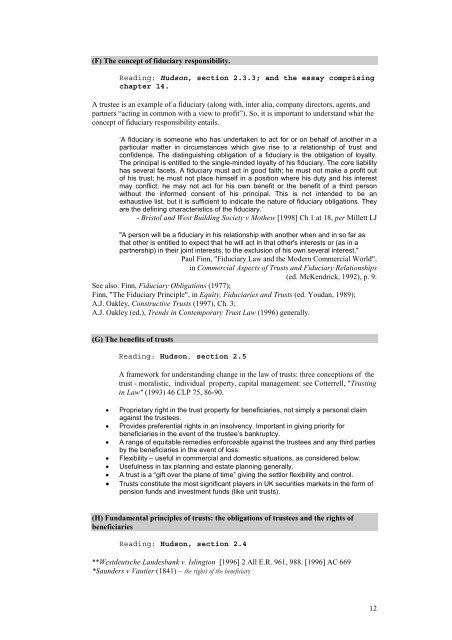Soton Equity and Trusts - alastairhudson.com
Soton Equity and Trusts - alastairhudson.com
Soton Equity and Trusts - alastairhudson.com
Create successful ePaper yourself
Turn your PDF publications into a flip-book with our unique Google optimized e-Paper software.
(F) The concept of fiduciary responsibility.<br />
Reading: Hudson, section 2.3.3; <strong>and</strong> the essay <strong>com</strong>prising<br />
chapter 14.<br />
A trustee is an example of a fiduciary (along with, inter alia, <strong>com</strong>pany directors, agents, <strong>and</strong><br />
partners “acting in <strong>com</strong>mon with a view to profit”). So, it is important to underst<strong>and</strong> what the<br />
concept of fiduciary responsibility entails.<br />
‘A fiduciary is someone who has undertaken to act for or on behalf of another in a<br />
particular matter in circumstances which give rise to a relationship of trust <strong>and</strong><br />
confidence. The distinguishing obligation of a fiduciary is the obligation of loyalty.<br />
The principal is entitled to the single-minded loyalty of his fiduciary. The core liability<br />
has several facets. A fiduciary must act in good faith; he must not make a profit out<br />
of his trust; he must not place himself in a position where his duty <strong>and</strong> his interest<br />
may conflict; he may not act for his own benefit or the benefit of a third person<br />
without the informed consent of his principal. This is not intended to be an<br />
exhaustive list, but it is sufficient to indicate the nature of fiduciary obligations. They<br />
are the defining characteristics of the fiduciary.’<br />
- Bristol <strong>and</strong> West Building Society v Mothew [1998] Ch 1 at 18, per Millett LJ<br />
"A person will be a fiduciary in his relationship with another when <strong>and</strong> in so far as<br />
that other is entitled to expect that he will act in that other's interests or (as in a<br />
partnership) in their joint interests, to the exclusion of his own several interest."<br />
Paul Finn, "Fiduciary Law <strong>and</strong> the Modern Commercial World",<br />
in Commercial Aspects of <strong>Trusts</strong> <strong>and</strong> Fiduciary Relationships<br />
(ed. McKendrick, 1992), p. 9.<br />
See also: Finn, Fiduciary Obligations (1977);<br />
Finn, "The Fiduciary Principle", in <strong>Equity</strong>, Fiduciaries <strong>and</strong> <strong>Trusts</strong> (ed. Youdan, 1989);<br />
A.J. Oakley, Constructive <strong>Trusts</strong> (1997), Ch. 3;<br />
A.J. Oakley (ed.), Trends in Contemporary Trust Law (1996) generally.<br />
(G) The benefits of trusts<br />
Reading: Hudson, section 2.5<br />
A framework for underst<strong>and</strong>ing change in the law of trusts: three conceptions of the<br />
trust - moralistic, individual property, capital management: see Cotterrell, "Trusting<br />
in Law" (1993) 46 CLP 75, 86-90.<br />
<br />
<br />
<br />
<br />
<br />
<br />
<br />
Proprietary right in the trust property for beneficiaries, not simply a personal claim<br />
against the trustees.<br />
Provides preferential rights in an insolvency. Important in giving priority for<br />
beneficiaries in the event of the trustee’s bankruptcy.<br />
A range of equitable remedies enforceable against the trustees <strong>and</strong> any third parties<br />
by the beneficiaries in the event of loss.<br />
Flexibility – useful in <strong>com</strong>mercial <strong>and</strong> domestic situations, as considered below.<br />
Usefulness in tax planning <strong>and</strong> estate planning generally.<br />
A trust is a “gift over the plane of time” giving the settlor flexibility <strong>and</strong> control.<br />
<strong>Trusts</strong> constitute the most significant players in UK securities markets in the form of<br />
pension funds <strong>and</strong> investment funds (like unit trusts).<br />
(H) Fundamental principles of trusts: the obligations of trustees <strong>and</strong> the rights of<br />
beneficiaries<br />
Reading: Hudson, section 2.4<br />
**Westdeutsche L<strong>and</strong>esbank v. Islington [1996] 2 All E.R. 961, 988. [1996] AC 669<br />
*Saunders v Vautier (1841) – the rights of the beneficiary<br />
12













